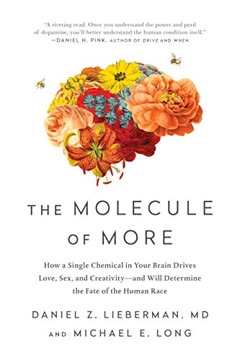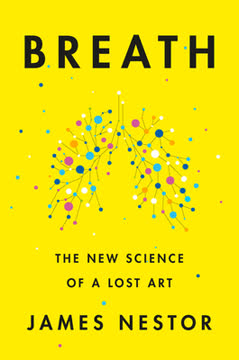முக்கியமான எடுத்துக்காட்டுகள்
1. டோபமைன் அதிகப்படியானது: நமது அதிகமான மகிழ்ச்சியின் உலகம்
ஸ்மார்ட்போன் என்பது நவீன காலத்தின் ஊசி போல, 24/7 டிஜிட்டல் டோபமைனை வழங்கி, நெட்வொர்க்கில் இணைந்த தலைமுறைக்கு ஊக்கம் அளிக்கிறது.
நமது டோபமைன் வெள்ளம் சூழ்ந்த உலகம். நாம் வாழும் காலம் மிகுந்த வளம் கொண்டது, எப்போதும் விரைவான மகிழ்ச்சியை தரும் ஊக்கங்கள் எங்கள் விரல்களின் முனையில் இருக்கின்றன. சமூக ஊடகம், ஸ்ட்ரீமிங் சேவைகள், விரைவான உணவு மற்றும் ஆன்லைன் ஷாப்பிங் போன்றவை உடனடி திருப்தியை வழங்கும் மூலாதாரங்கள். இந்த டோபமைன் உண்டாக்கும் செயல்களில் தொடர்ந்து ஈடுபடுவதால், மகிழ்ச்சி மற்றும் வலியின் மீதான நமது உறவு அடிப்படையாக மாற்றம் அடைந்துள்ளது.
தொடர்ந்த மகிழ்ச்சியின் செலவு. இந்த வளம் கனவாகத் தோன்றினாலும், அதனுடன் கூடிய சில தீமைகள் உள்ளன:
- பல்வேறு பொருட்கள் மற்றும் பழக்கங்களில் அடிமைத்தன்மை அதிகரிப்பு
- கவலை, மனச்சோர்வு மற்றும் நீண்டகால வலி அதிகரிப்பு
- எளிய மகிழ்ச்சிகளில் சந்தோஷம் காணும் திறன் குறைவு
- திருப்தியை தாமதப்படுத்துவதிலும், நீண்டகால இலக்குகளை நோக்கி கவனம் செலுத்துவதிலும் சிரமம்
இந்த டோபமைன் நிறைந்த சூழலை நாங்கள் எப்படி சமாளிப்பது என்பது நமது முன்னிலை சவால்.
2. நமது மூளையில் மகிழ்ச்சி-வலி சமநிலை புரிதல்
விஞ்ஞானிகள் எந்த அனுபவத்தின் அடிமைத்தன்மையை அளவிட டோபமைனை ஒரு பொதுவான நாணயமாகப் பயன்படுத்துகிறார்கள். மூளையின் வெகுமதி பாதையில் டோபமைன் அதிகமாக இருந்தால், அந்த அனுபவம் அதிகமாக அடிமைபடுத்தும்.
மூளையின் சமநிலை செயல்பாடு. மகிழ்ச்சி மற்றும் வலி ஒரே பகுதிகளில் செயல்படுகின்றன, சமநிலையைப் போல. மகிழ்ச்சி அனுபவிக்கும் போது, டோபமைன் வெளியேறி சமநிலையை ஒரு பக்கமாக மாற்றுகிறது. ஆனால், மூளை சமநிலையை மீட்டெடுக்க விரைந்து செயல்பட்டு, சில நேரங்களில் அதிர்ச்சியோடு சிறிய வலி அல்லது ஆசையை ஏற்படுத்துகிறது.
இந்த சமநிலையின் முக்கிய அம்சங்கள்:
- சகிப்புத்தன்மை: மீண்டும் மீண்டும் அனுபவிப்பதால், அதே மகிழ்ச்சியை பெற அதிக ஊக்கங்கள் தேவைப்படுகின்றன
- விலகல்: மகிழ்ச்சியான ஊக்கத்தை இழந்தபோது ஏற்படும் வலி அல்லது அசௌகரியம்
- நியூரோஅடாப்டேஷன்: மீண்டும் மீண்டும் அனுபவிப்பதால் மூளையின் அமைப்பு மற்றும் செயல்பாட்டில் நீண்டகால மாற்றங்கள்
இந்த சமநிலையை புரிந்து கொள்வது, அடிமைத்தன்மை பழக்கங்களுடன் நாம் ஏன் போராடுகிறோம் மற்றும் சமநிலையை மீட்டெடுக்க எப்படி முயல வேண்டும் என்பதைக் காட்டுகிறது.
3. சுய-பிணைப்பு: கட்டாய பழக்கங்களை கட்டுப்படுத்த தடைகள் உருவாக்குதல்
சுய-பிணைப்பு என்பது மனச்சக்தியின் வரம்புகளை வெளிப்படையாக ஏற்றுக்கொள்கிறது.
முன்னெச்சரிக்கை நடவடிக்கை. சுய-பிணைப்பு என்பது நமது அடிமைத்தன்மை பழக்கங்களுக்கும் நம்மிடையேயான தடைகளை意மாக உருவாக்குவதாகும். மனச்சக்தி மட்டும் பலமில்லை என்பதை ஏற்றுக்கொண்டு, பலவீனமான தருணங்களில் கட்டாய ஆசைகளை எதிர்கொள்ள இந்த முறையை பயன்படுத்துகிறோம்.
சுய-பிணைப்பின் வகைகள்:
- உடல் சார்ந்தது: சுற்றுப்புறத்திலிருந்து கவர்ச்சிகளை அகற்றுதல் (உதாரணமாக, சமூக ஊடக செயலிகளை நீக்குதல்)
- கால சார்ந்தது: குறிப்பிட்ட செயல்களுக்கு நேர வரம்புகளை அமைத்தல்
- வகை சார்ந்தது: சில வகை பழக்கங்கள் அல்லது பொருட்களைத் தவிர்த்தல்
சுய-பிணைப்பின் உதாரணங்கள்:
- கவனத்தை பறிக்கும் இணையதளங்களை தடுக்கும் செயலிகள் பயன்படுத்துதல்
- வீட்டில் ஜங்க் உணவுகளை வைக்காமல் இருக்குதல்
- அதிக செலவுகளைத் தடுக்கும் தானாக சேமிப்பு மாற்றங்களை அமைத்தல்
இந்த தடைகளை உருவாக்குவதன் மூலம், கவர்ச்சியை எதிர்க்கவும், ஆரோக்கியமான பழக்கங்களை பராமரிக்கவும் எளிதாகும்.
4. டோபமைன் விரதம்: நமது வெகுமதி பாதைகளை மீட்டமைத்தல்
விரதம் மூளையின் வெகுமதி பாதையை மீட்டமைக்கிறது, அதனுடன் எளிய மகிழ்ச்சிகளை அனுபவிக்கும் திறனையும்.
விரதத்தின் சக்தி. டோபமைன் விரதம் என்பது அதிக ஊக்கமளிக்கும் செயல்களில் தற்காலிகமாக இருந்து, நமது வெகுமதி அமைப்புகளுக்கு சமநிலையை மீட்டமைக்க உதவுகிறது. இது அடிமைத்தன்மை வட்டங்களை உடைக்கவும், அன்றாட அனுபவங்களில் மகிழ்ச்சியை மீண்டும் கண்டுபிடிக்கவும் உதவும்.
வெற்றிகரமான டோபமைன் விரதத்தின் முக்கிய அம்சங்கள்:
- காலம்: பொதுவாக சிறந்த விளைவுகளுக்கு 4 வாரங்கள்
- முழுமை: அனைத்து உயர் டோபமைன் ஊக்கங்களையும் தவிர்த்தல்
- மனச்சாட்சி: இந்த செயல்பாட்டின் போது நமது எண்ணங்கள் மற்றும் உணர்வுகளை கவனித்தல்
- ஆதரவு: நண்பர்கள், குடும்பம் அல்லது நிபுணர்களிடமிருந்து உதவி பெறுதல்
டோபமைன் விரதத்தின் நன்மைகள்:
- இயற்கை வெகுமதிகளுக்கு அதிக உணர்திறன்
- கவனம் மற்றும் உற்பத்தித்திறன் மேம்பாடு
- கவலை மற்றும் கட்டாய பழக்கங்கள் குறைவு
- எளிய மகிழ்ச்சிகளுக்கு அதிக மதிப்பீடு
சவாலானாலும், டோபமைன் விரதம் மகிழ்ச்சி மற்றும் வலி மீதான நமது உறவை மீட்டமைக்க ஒரு சக்திவாய்ந்த கருவியாக இருக்க முடியும்.
5. வலியை ஏற்றுக்கொள்வது: நலனுக்கான எதிர்மறை பாதை
வலி உடலின் தானியங்கி சமநிலை அமைப்புகளை தூண்டுவதால் மகிழ்ச்சிக்கு வழிவகுக்கிறது.
அசௌகரியத்தின் நன்மைகள். நமது இயல்பான உணர்வுகளுக்கு மாறாக, சில வகையான வலி அல்லது அசௌகரியங்களை நோக்கி செல்வது நலன்களை அதிகரிக்க உதவும். இந்த கருத்து, ஹார்மெசிஸ் என அழைக்கப்படுகிறது, இது மிதமான மன அழுத்தத்தை அனுபவித்து, மனச்சக்தி மற்றும் நேர்மறை மாற்றங்களை ஊக்குவிக்கிறது.
நன்மை தரும் மன அழுத்த உதாரணங்கள்:
- குளிர் வெளிப்பாடு (உதாரணமாக, ஐஸ் பாத்துகள், குளிர் குளிப்புகள்)
- தீவிர உடற்பயிற்சி
- இடைவேளை நோன்பு
- சவாலான மனப்பணிகள்
இந்த கட்டுப்படுத்தப்பட்ட மன அழுத்தங்களுடன் ஈடுபடுவதன் மூலம், நாம்:
- மனநிலையை மற்றும் சக்தி நிலையை மேம்படுத்தலாம்
- உடல் ஆரோக்கியம் மற்றும் ஆயுளை அதிகரிக்கலாம்
- மனச்சக்தி மற்றும் கவனத்தை மேம்படுத்தலாம்
- செயற்கை ஊக்கங்களுக்கு நம்பிக்கையை குறைக்கலாம்
முக்கியம் சரியான சமநிலை கண்டுபிடிப்பது – வளர்ச்சிக்கு போதுமான மன அழுத்தம், ஆனால் அது மிகுந்து பாதிப்பதில்லை.
6. முழுமையான நேர்மை: மீட்பில் உண்மையைச் சொல்லும் சக்தி
உண்மையைச் சொல்லுவது மக்களை ஈர்க்கிறது, குறிப்பாக நமது பலவீனங்களை வெளிப்படுத்த தயாராக இருந்தால்.
நேர்மையின் மாற்றும் சக்தி. முழுமையான நேர்மை பயிற்சி – வாழ்க்கையின் அனைத்து அம்சங்களிலும் உண்மையாக இருப்பது, கூடுதல் சிரமமான தருணங்களிலும் – தனிப்பட்ட வளர்ச்சிக்கும் அடிமைத்தன்மை பழக்கங்களிலிருந்து மீட்புக்கும் ஒரு சக்திவாய்ந்த கருவியாக இருக்கிறது.
முழுமையான நேர்மையின் நன்மைகள்:
- அதிகமான சுய அறிவு
- வலுவான, உண்மையான உறவுகள்
- பொய்களை பராமரிப்பதில் இருந்து மன அழுத்தம் குறைவு
- நமது செயல்களுக்கு அதிக பொறுப்புணர்வு
முழுமையான நேர்மையை நடைமுறைப்படுத்த:
- சிறிய உண்மைகளிலிருந்து தொடங்கி பெரியவைகளுக்கு செல்லுங்கள்
- கடினமான உண்மைகளை வெளிப்படுத்தும் போது தன்னைத்தானே கருணையுடன் அணுகுங்கள்
- நம்பகமான நபர்கள் அல்லது குழுக்களிடமிருந்து ஆதரவு தேடுங்கள்
- நேர்மையை மற்றவர்களை காயப்படுத்த அல்லாமல், தொடர்பு கொள்ள ஒரு வழியாக பயன்படுத்துங்கள்
முழுமையான நேர்மையை ஏற்றுக்கொள்வதன் மூலம், நீண்டகால மாற்றத்திற்கும் நமது மற்றும் பிறருடன் ஆழமான தொடர்புகளுக்கும் அடித்தளத்தை உருவாக்கலாம்.
7. சமூகத் துன்பம்: பொறுப்புணர்வை பயன்படுத்தி நேர்மறை மாற்றம்
சமூகத் துன்பம் நம்மை மனிதக் குலத்துடன் சேர்ந்தவர்களாக உறுதிப்படுத்துகிறது.
துன்பத்தை பயனுள்ளதாக மாற்றுதல். துன்பம் பெரும்பாலும் எதிர்மறையாகக் கருதப்படுவதாலும், சமூகத் துன்பம் நேர்மறை மாற்றத்திற்கு ஒரு சக்திவாய்ந்த ஊக்கமாக இருக்க முடியும். இது நமது தவறுகளை ஆதரவு மிக்க சமூகத்தில் ஏற்றுக்கொண்டு, மன்னிப்பு மற்றும் வளர்ச்சிக்கான தெளிவான வழிகளை வழங்குகிறது.
சமூகத் துன்பத்தின் முக்கிய அம்சங்கள்:
- நிராகரிப்பு இல்லாமல் பொறுப்புணர்வு
- சரிசெய்யும் தெளிவான வழிகாட்டுதல்கள்
- தனிப்பட்ட வளர்ச்சி மற்றும் கற்றல் மீது கவனம்
- சக மாணவர்கள் மற்றும் சமூக ஆதரவு
சமூகத் துன்பத்தின் செயல்பாட்டில் உதாரணங்கள்:
- ஆல்கஹாலிக்ஸ் அனானிமஸ் போன்ற 12 படி திட்டங்கள்
- மீட்பு நீதி நடைமுறைகள்
- குடும்ப அல்லது சமூக தலையீடுகள்
துன்பத்தை தண்டனையாக அல்லாமல் வளர்ச்சிக்கான கருவியாக மாற்றுவதன் மூலம், நீண்டகால பழக்க மாற்றத்தையும் சமூக உறவுகளையும் வலுப்படுத்தும் சூழலை உருவாக்கலாம்.
8. டோபமைன் நிரம்பிய உலகில் சமநிலை காணுதல்
உலகத்திலிருந்து ஓடுவதற்கு பதிலாக, அதில் முழுமையாக ஈடுபடுவதன் மூலம் ஓய்வு காணலாம்.
நிலையான மகிழ்ச்சியை வளர்த்தல். இறுதி நோக்கம், டோபமைன் நிறைந்த சூழலில் சமநிலையை கண்டுபிடித்து, கட்டாயமான அதிகப்படியான பயன்பாட்டில் விழாமல் வாழ்க்கையின் மகிழ்ச்சிகளை அனுபவிப்பதாகும்.
சமநிலையை பராமரிக்கும் முறைகள்:
- மனச்சாட்சியுடன் தற்போதைய தருணத்தில் இருப்பது
- இயற்கையான, நிலையான வெகுமதிகளை தரும் செயல்களில் ஈடுபடுதல்
- அர்த்தமுள்ள உறவுகள் மற்றும் சமூக தொடர்புகளை வளர்த்தல்
- அடிமைத்தன்மை வாய்ந்த பழக்கங்களுக்கு தெளிவான எல்லைகளை அமைத்தல்
- தொழில்நுட்பம் மற்றும் பிற ஊக்கங்களுடன் நமது உறவை அடிக்கடி மதிப்பாய்வு செய்து சரிசெய்தல்
இந்த நடைமுறைகளை செயல்படுத்துவதன் மூலம், டோபமைன் நிரம்பிய உலகில் நுணுக்கமாக பயணித்து, வாழ்க்கையின் எளிய மகிழ்ச்சிகளிலும் தீவிர அனுபவங்களிலும் சந்தோஷம் காணலாம், நம்மை இழக்காமல்.
கடைசியாக புதுப்பிக்கப்பட்டது:
FAQ
What's Dopamine Nation about?
- Exploration of Pleasure and Pain: Dopamine Nation by Anna Lembke explores the complex relationship between pleasure and pain, highlighting how this balance is crucial for a fulfilling life.
- Neuroscience of Addiction: The book delves into the role of dopamine as a key player in addiction, explaining how it acts as a "universal currency" for measuring the addictive potential of experiences.
- Personal Stories and Insights: Lembke enriches the narrative with real-life stories from her patients, illustrating their struggles with addiction and recovery, making the scientific concepts more relatable.
Why should I read Dopamine Nation?
- Understanding Modern Challenges: The book provides insights into the compulsive overconsumption prevalent in today's society, helping readers recognize their own behaviors and the underlying neuroscience.
- Practical Solutions Offered: Lembke offers practical advice on managing compulsive behaviors, including "dopamine fasting" and self-binding strategies, to help regain control over consumption habits.
- Empathy and Connection: Through patient stories, Lembke fosters empathy and understanding for those struggling with addiction, encouraging readers to reflect on their own lives and relationships.
What are the key takeaways of Dopamine Nation?
- Pleasure-Pain Balance: The book emphasizes maintaining a balance between pleasure and pain, as excessive pleasure can lead to addiction and increased pain sensitivity.
- Dopamine Fasting: Lembke introduces "dopamine fasting" to reset the brain's reward system, helping individuals enjoy simple pleasures again.
- Self-Binding Strategies: The author discusses self-binding as a method to create barriers between oneself and addictive behaviors, using physical, chronological, and categorical techniques.
What is dopamine, and why is it important in Dopamine Nation?
- Dopamine as a Neurotransmitter: Dopamine plays a crucial role in the brain's reward system, influencing motivation and pleasure, and is released during pleasurable activities.
- Addiction Measurement: The more dopamine a behavior or substance releases, the more addictive it becomes, making dopamine a key factor in understanding addiction.
- Impact on Balance: Excessive dopamine release can tip the pleasure-pain balance, leading to a cycle of addiction and increased pain sensitivity.
What is dopamine fasting, and how does it work in Dopamine Nation?
- Definition of Dopamine Fasting: It involves abstaining from high-dopamine activities to reset the brain's reward system, such as avoiding social media and junk food.
- Benefits of the Practice: This practice helps individuals regain sensitivity to pleasure and appreciate simpler experiences, with many reporting improved well-being after abstinence.
- Implementation: Lembke suggests starting with a month-long dopamine fast to observe changes in mood and cravings, allowing the brain to recalibrate.
What are self-binding strategies mentioned in Dopamine Nation?
- Creating Barriers: Self-binding involves creating barriers between oneself and addictive behaviors to reduce relapse likelihood, such as removing temptations.
- Chronological and Categorical Binding: Lembke categorizes self-binding into physical, chronological, and categorical types, helping manage consumption by limiting access or defining acceptable behaviors.
- Real-Life Examples: The book provides examples of patients successfully implementing self-binding strategies, empowering individuals to control their behaviors.
How does Dopamine Nation address the societal impact of addiction?
- Cultural Commentary: Lembke critiques society's obsession with pleasure and the resulting rise in addiction rates, highlighting the abundance of high-dopamine stimuli.
- Economic Factors: The book discusses how socioeconomic status influences access to addictive substances and the prevalence of addiction, noting disparities among demographic groups.
- Call to Action: Lembke encourages reflection on personal consumption habits and societal structures enabling addiction, advocating for a compassionate understanding of addiction as a public health issue.
How does Dopamine Nation address the role of technology in addiction?
- Technology as a Trigger: Lembke discusses how technology, especially social media and gaming, can trigger addictive behaviors due to constant availability of pleasurable stimuli.
- Dopamine Overload: Technology can create a dopamine overload, making it difficult to find joy in simpler activities, leading to a cycle of seeking more intense experiences.
- Strategies for Moderation: Lembke offers strategies like setting boundaries and engaging in dopamine fasting to manage technology use and reduce addiction risk.
What is the pleasure-pain balance discussed in Dopamine Nation?
- Concept of Balance: The pleasure-pain balance refers to the brain's wiring to seek pleasure and avoid pain, with excessive indulgence leading to negative consequences.
- Impact on Addiction: Addiction arises when individuals become desensitized to pleasure, requiring more intense experiences for satisfaction, leading to a cycle of increased pain.
- Restoration through Moderation: The book advocates for moderation and self-binding to restore balance, promoting a healthier relationship with pleasure and pain.
What is the significance of radical honesty in recovery as described in Dopamine Nation?
- Foundation for Recovery: Radical honesty is essential for successful recovery, allowing individuals to confront behaviors and underlying issues contributing to addiction.
- Building Connections: Honesty fosters deeper connections, creating a supportive environment crucial for recovery and a sense of belonging.
- Promoting Self-Awareness: Radical honesty encourages self-reflection and awareness, vital for making meaningful changes and cultivating awareness in recovery.
What are the risks of compulsive overconsumption discussed in Dopamine Nation?
- Health Consequences: Lembke outlines physical and mental health risks, including addiction, anxiety, and depression, emphasizing the cycle of negative outcomes.
- Social Implications: Compulsive behaviors can strain relationships and lead to social isolation, highlighting addiction's broader impact on individuals and communities.
- Cultural Context: The issue is placed within modern society's context, where easy access to pleasurable stimuli contributes to rising addiction and mental health issues.
How does Dopamine Nation suggest we can achieve balance in our lives?
- Mindfulness Practices: Lembke advocates for mindfulness to cultivate awareness of behaviors and consequences, promoting intentional choices regarding consumption.
- Dopamine Fasting: Temporarily abstaining from pleasurable activities helps reset the brain's reward pathways, allowing appreciation for simpler pleasures.
- Community Support: Engaging with supportive networks, such as support groups or friends, provides encouragement needed to maintain healthier habits.
விமர்சனங்கள்
டோபமைன் நேஷன் என்ற நூல் பல்வேறு விமர்சனங்களை பெற்றது. சில வாசகர்கள் இதனை போதைப் பொருள் மற்றும் டோபமைனின் பங்கு குறித்து அறிவார்ந்ததும் ஆழமானதும் எனக் கருதினார்கள். ஆனால், பலர் இதன் சிக்கலான பிரச்சனைகளை எளிமைப்படுத்தி, நெறிமுறையற்ற குரலில் பேசுவதாகவும், விவரக்குறைவாகவும் விமர்சித்தனர். எழுத்தாளர் கதைகளில் அதிகமாக நம்பிக்கை வைக்கிறார், அறிவியல் ஆதாரமின்றி சந்தேகத்திற்குரிய கூற்றுகளை முன்வைக்கிறார் என்றும், போதைப் பழக்கத்தை பாதிக்கும் சமூக-பொருளாதார காரணிகளைப் பற்றிய புரிதல் குறைவாக உள்ளது என்றும் விமர்சகர்கள் உணர்ந்தனர். சிலர் மருத்துவ மற்றும் தனிப்பட்ட அனுபவங்களின் கலவையை பாராட்டினாலும், மற்றவர்கள் எழுத்தாளரின் தனிப்பட்ட வெளிப்பாடுகள் மற்றும் நோயாளி கதைகள் பொருத்தமற்றவையோ அல்லது ஆழமற்றவையோ எனக் கண்டனர்.
Similar Books















